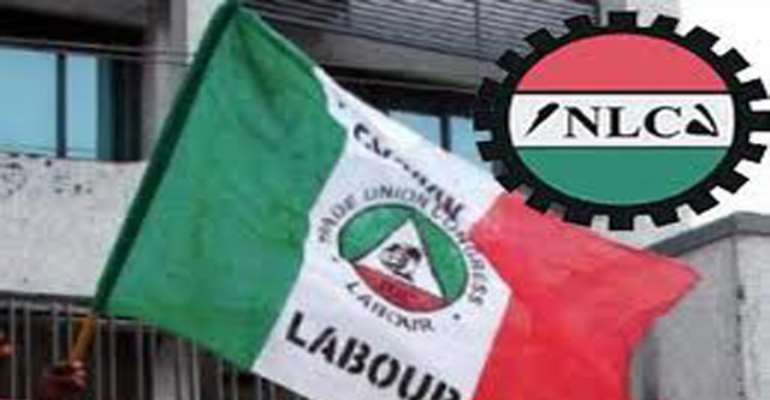Labour's unworkable new wage proposal – Punch

A proposal by the Nigeria Labour Congress to confront the Muhammadu Buhari government with a new minimum wage demand as soon as it is inaugurated on May 29 is hasty and unrealistic. The NLC President, Ayuba Wabba, served notice to this effect during the May Day celebration in Abuja. He had predicated the request on the continuing devaluation of the naira and other inflationary pressure that coalesced to render the current N18, 000 minimum wage valueless.
Admittedly, wage reviews have a five-year cycle in line with global labour practice. After a protracted negotiation with organised labour, the Federal Government in 2010 acceded to the existing minimum wage, which the National Assembly enacted into law in 2011. However, its implementation in both the public and organised private sectors has been anything but successful.
Wabba decried this development in his May 1 speech, stressing, '…those agencies of government and other private sector employers not complying with the provisions of the 2011 National Minimum Wage Act are breaking the law of the land. A government or corporate entity that refuses to obey the law of the land is surely expressing its preference for anarchy.'
Even before the oil prices in the international market began to tumble mid-2014, with its corollary of drastic shortfall in public revenue, many state governments had observed the N18, 000 minimum wage only in the breach. For instance, in Benue State, primary school teachers and civil servants went on strike in 2014, that lasted for over six months for the former, over unpaid salaries. The situation has worsened since then for the states, evident in a recent All Progressives Congress governors' appeal to Buhari to consider a financial bailout for the states as soon as he mounts the saddle of leadership. Even Abuja is as wobbly and hopeless as the states that look up to it for a rescue.
With no hope in sight, the NLC is now mulling a shut-down of airports to compel action. Its National vice-president, Lucy Offiong, who hinted of this move recently, argued: 'Governors who are among the most frequent users of airports may need to be deprived of the facilities so that they would be moved to give workers their monthly wage.' That will be unnecessary.
We agree that a society functions best when prosperity is broadly shared. What about many low-wage workers for whom every day involves struggle and sacrifice? For them, just a little top-up would mean a little more breathing room and peace of mind. Yet, we believe that the current state of the economy cannot shoulder the burden. Though it is irresponsible for state governments not to have fully implemented the 2011 wage review, the hard truth is that the new demand is unsustainable in the face of the alarmingly dwindling revenue.
What has imperilled minimum wage implementation in Nigeria is the greed of senior civil servants, who always insist that any upward salary review for the low income earners be spread across board. In developed economies, this is not usually the case. A few states that pay the 2011 wage increase, focusing on grade levels 1 to 6 workers, have unwittingly fuelled industrial chaos or strike for themselves. It is, odd that governments often scrounge or borrow to pay workers salaries despite the long spell of oil boom the country has enjoyed.
Besides the N473 billion which the Federal Government borrowed in the first quarter of this year to offset wages and other recurrent charges, the Debt Management Office's attempt to rationalise in an advertorial, last Thursday, the $18.3 billion public debt acquired between 2011 and 2014 shows how deep-seated this weird practice is here. It said, 'In 2010, there was a general wage increase (53.7 per cent average increase) for all categories of public servants, including political appointees. The funding of this depended largely on increased domestic borrowing.' This is wrong.
Rather than court such anger, organised labour should be more concerned about how good governance could be entrenched in the country by acting as one of its agents. The labour of old constituted itself as a formidable barricade against obnoxious government policies and corrupt public officials. Had the post-Adams Oshiomhole NLC leadership been an active voice against the looting of public treasury and profligate government spending, the N2.5 trillion fuel subsidy bazaar of 2011 might not have happened; and the economy would have been the better for it. It also watches idly by, while our National Assembly lawmakers continue to collect the highest emoluments among legislators in the world, according to The Economist of London.
These are sickening anomalies that ought to interest labour now. It is inevitable that a new wage increase will shut down government or be a launch pad for mass retrenchment of workers in the public sector. Instructively, the private sector too is being haemorrhaged with job cuts in banks, and lately in the oil and gas sector, while the inclement business climate has driven entrepreneurs that would have created new jobs under.
Therefore, Labour needs to be circumspect in agitating for another raise of the national wage floor. In other climes, workers welfare is sometimes achieved through other ways and means, such as tax cuts and low fares in public buses and trains. The benefits from these could be huge; and are options for the labour in this austere economic time. It will definitely pay off, instead of bristling for a salary increment that may not be of any value or honoured by employers.
It is the duty of government to ensure that workers are paid properly and for all the hours they work. But it is pointless to have a blanket minimum wage across the country and reckless not to consider the state of the economy in making a demand for minimum wage review.
